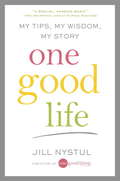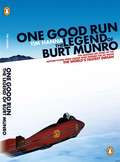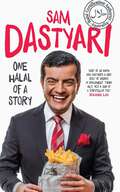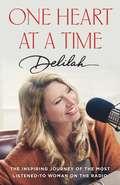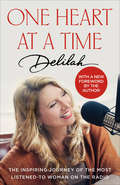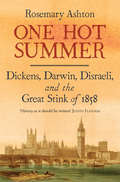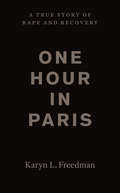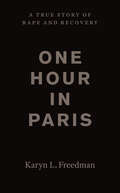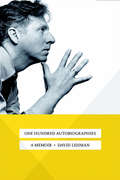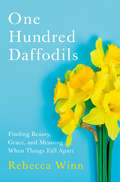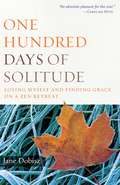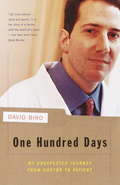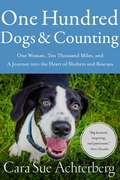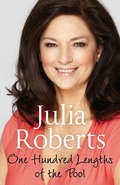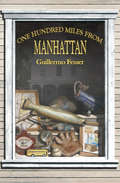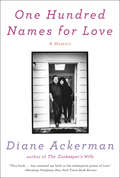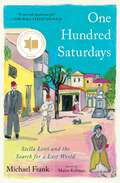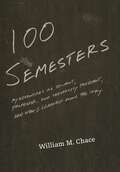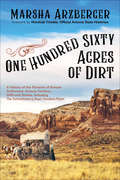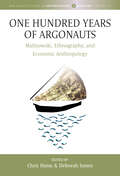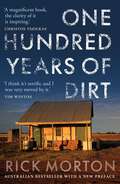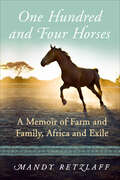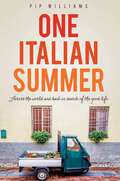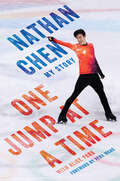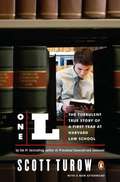- Table View
- List View
One Good Life
by Jill NystulThe blogger behind One Good Thing by Jillee shares her never-before-told life story alongside the tips and wisdom that have earned her millions of devoted followers.Jill Nystul started her blog, One Good Thing by Jillee, as a means to take steps forward after emerging from rehabilitation from alcohol dependence and battling a slew of equally tough issues that tested her confidence as a wife and mother. Her goal was to pursue her passion and help others along the way--one day at a time and one step at a time--by writing about one good thing each day.It is clear that Nystul's ability to appreciate the little things has resonated with readers everywhere. Fans have fallen in love with her crafty household endeavors, delicious recipes, and words of wisdom. One Good Life presents "75 Good Things by Jillee," fifty of which have never before been published, intertwined with Nystul's personal story, revealed here for the first time. Drawing from her own experiences, Nystul shows how she has overcome tremendous hardship to finally re-embrace her faith and appreciate, each day, one good thing.
One Good Run: The Legend of Burt Munro
by Tim Hanna"All Burt Munro wanted was one perfect run on his highly modified Indian Scout Motorcycle- to see how fast it would really go. In a tiny home workshop in New Zealand, with the barest of tools, but a native engineering genius, he constantly rebuilt and modified a unique speed machine, bought brand newi n 1920 for $50. After running out of challenges at home and already aged in his sixties, Burt took his 'Munro Special' to the famous Bonneville salt flats in Utah where he became a legend."day. The life story of Burt Munro is one of triumph over limitation, achievement against all odds. Brave, funny, gritty and brilliant, he was quite literally one of the original speed freaks, whose exploits have now inspired the hit movie The World's Fastest Indian starring Sir Anthony Hopkins.
One Halal of a Story
by Sam DastyariAs in life, Sam Dastyari's memoir is unexpected and unorthodox. This is the man who introduced Pauline Hanson to the halal snack pack and accountability to big banks.Named Sahand by his hippy Iranian parents, he changed his name to Sam to fit in with his schoolmates. But Sam was always going to stand out.He joined the Labor Party when he was 16 and was elected as a senator only 13 years later. Sam brings his super-charged approach to life to his writing and the result is hilarious: part-memoir, part-political treatise and part-reflection on hard times.We learn about his cats, Lenin and Trotsky; how to deal with neighbours when their front lawns are under siege from the media thanks to your misdemeanour; and how the most dangerous mosh pits are to be found among parents at the school nativity play.One Halal of a Story is a no-holds-barred look at the good and bad of family, politics, and being Sam.
One Heart at a Time
by Delilah“You’re listening to Delilah.”Delilah, the most listened to woman on American radio, has distinguished herself as the “Queen of Sappy Love Songs” and America’s ultimate romance guru. But Delilah’s life off-air is all the more extraordinary—a life full of trials, forgiveness, faith, and adventure. In One Heart at a Time, Delilah’s heartfelt account of her own story reveals what shaped the voice that 9 million listeners know and love.Today, Delilah is the founder of an NGO called Point Hope, the owner of a 55-acre working farm, and an inductee of the National Radio Hall of Fame. But to achieve this, she often had to pave her own way. Disowned by her father, divorced, and fired from a dozen jobs over the years, Delilah pushed forward through family addiction and devastating loss, through glass ceilings and red tape. Her consistent goal to help those in need took her everywhere from the streets of Philadelphia to refugee camps in Ghana.Along the way, Delilah was blessed by 13 children, 10 of them adopted. Though many of them contend with special needs and the forever effects of a broken foster care system, her children have been able to transform their own remarkable lessons into guiding lights for other kids in need. Just as Delilah has done.One Heart at a Time exposes the real woman behind the microphone. In her easy-going style and characteristic, beloved voice, Delilah tells her deeply moving life story as the series of miracles it is.A portion of proceeds will be donated to Point Hope.
One Heart at a Time: The Inspiring Journey of the Most Listened-To Woman on the Radio
by Delilah“You’re listening to Delilah.” Delilah, the most listened-to woman on American radio, has distinguished herself as the “Queen of Sappy Love Songs” and America’s ultimate romance guru. But Delilah’s life off-air is all the more extraordinary—a life full of trials, forgiveness, faith, and adventure. In One Heart at a Time, Delilah’s heartfelt account of her own story reveals what shaped the voice that 9 million listeners know and love. Today, Delilah is the founder of an NGO called Point Hope, the owner of a 55-acre working farm, and an inductee of the National Radio Hall of Fame. But to achieve this, she often had to pave her own way. Disowned by her father, divorced, and fired from a dozen jobs over the years, Delilah pushed forward through family addiction and devastating loss, through glass ceilings and red tape. Her consistent goal to help those in need took her everywhere from the streets of Philadelphia to refugee camps in Ghana. Along the way, Delilah was blessed by thirteen children—ten of them adopted. Though many of them contend with special needs and the forever effects of a broken foster care system, her children have been able to transform their own remarkable lessons into guiding lights for other kids in need. Just as Delilah has done. One Heart at a Time exposes the real woman behind the microphone. In her easy-going style and characteristic, beloved voice, Delilah tells her deeply moving life story as the series of miracles it is.
One Hot Summer: Dickens, Darwin, Disraeli, and the Great Stink of 1858
by Rosemary AshtonA unique, in-depth view of Victorian London during the record-breaking summer of 1858, when residents both famous and now-forgotten endured “The Great Stink” together While 1858 in London may have been noteworthy for its broiling summer months and the related stench of the sewage-filled Thames River, the year is otherwise little remembered. And yet, historian Rosemary Ashton reveals in this compelling microhistory, 1858 was marked by significant, if unrecognized, turning points. For ordinary people, and also for the rich, famous, and powerful, the months from May to August turned out to be a summer of consequence. Ashton mines Victorian letters and gossip, diaries, court records, newspapers, and other contemporary sources to uncover historically crucial moments in the lives of three protagonists—Charles Dickens, Charles Darwin, and Benjamin Disraeli. She also introduces others who gained renown in the headlines of the day, among them George Eliot, Karl Marx, William Thackeray, and Edward Bulwer Lytton. Ashton reveals invisible threads of connection among Londoners at every social level in 1858, bringing the celebrated city and its citizens vibrantly to life.
One Hour in Paris: A True Story of Rape and Recovery
by Karyn L. FreedmanIn this powerful memoir, philosopher Karyn L. Freedman travels back to a Paris night in 1990 when she was twenty-two and, in one violent hour, her life was changed forever by a brutal rape. One Hour in Paris takes the reader on a harrowing yet inspirational journey through suffering and recovery both personal and global. We follow Freedman from an apartment in Paris to a French courtroom, from a trauma centre in Toronto to a rape clinic in Africa. At a time when as many as one in three women in the world have been victims of sexual assault and when many women are still ashamed to come forward, Freedman's book is a moving and essential look at how survivors cope and persevere. At once deeply intimate and terrifyingly universal, One Hour in Paris weaves together Freedman's personal experience with the latest philosophical, neuroscientific, and psychological insights into what it means to live in a body that has been traumatized. Using her background as a philosopher, she looks at the history of psychological trauma and draws on recent theories of posttraumatic stress disorder and neuroplasticity to show how recovery from horrific experiences is possible. Through frank discussions of sex and intimacy, she explores the consequences of sexual violence on love and relationships, and she illustrates the steep personal cost of sexual violence and the obstacles faced by individual survivors in its aftermath. Freedman's book is an urgent call to face this fundamental social problem head-on, arguing that we cannot continue to ignore the fact that sexual violence against women is rooted in gender inequalities that exist worldwide—and must be addressed. One Hour in Paris is essential reading for survivors of sexual violence as well as an invaluable resource for therapists, mental health professionals, and family members and friends of victims.
One Hour in Paris: A True Story of Rape and Recovery
by Karyn L. FreedmanA powerful memoir, Karyn L. Freedman’s One Hour in Paris is a harrowing yet inspirational journey through suffering and recovery both personal and global.On a Paris night in 1990 when Karyn L. Freedman was just twenty-two, she was brutally raped. In the wake of the violent encounter, she found herself in a French courtroom, a Toronto trauma center, and a rape clinic in Africa. Her life was forever changed. At a time when as many as one in three women in the world have been victims of sexual assault and when many women are still ashamed to come forward, Freedman’s book is a moving and essential look at how survivors cope and persevere.At once deeply intimate and terrifyingly universal, One Hour in Paris weaves together Freedman’s personal experience with philosophical, neuroscientific, and psychological insights on what it means to live in a traumatized body. Using her philosopher’s background, she studies the history of psychological trauma, drawing on theories of post-traumatic stress disorder and neuroplasticity to show how recovery from horrific experiences is possible. Through frank discussions of sex and intimacy, she explores the consequences of sexual violence for love and relationships, illustrating the steep personal cost and the obstacles faced by individual survivors in its aftermath. Freedman’s book is an urgent call to face this fundamental social problem head-on, arguing that we cannot continue to ignore the fact that sexual violence against women is rooted in gender inequalities that exist worldwide—and must be addressed.One Hour in Paris is essential reading for sexual violence survivors and an invaluable resource for therapists, mental health professionals, and family members and friends of victims.
One Hundred Autobiographies: A Memoir
by David LehmanIn One Hundred Autobiographies, poet and scholar David Lehman applies the full measure of his intellectual powers to cope with a frightening diagnosis and painful treatment for cancer. No matter how debilitating the medical procedures, Lehman wrote every day during chemotherapy and in the aftermath of radical surgery. With characteristic riffs of wit and imagination, he transmutes the details of his inner life into a prose narrative rich in incident and mental travel. The reader journeys with him from the first dreadful symptoms to the sunny days of recovery.This "fake memoir," as he refers ironically to it, features one-hundred short vignettes that tell a life story. One Hundred Autobiographies is packed with insights and epiphanies that may prove as indispensable to aspiring writers as Rilke's Letters to a Young Poet.Set against the backdrop of Manhattan, Lehman summons John Ashbery, Kenneth Koch, Edward Said, and Lionel Trilling among his mentors. Dostoyevsky shows up, as does Graham Greene. Keith Richards and Patti Hansen put in an appearance, Edith Piaf sings, Clint Eastwood saves the neighborhood, and the Rat Pack comes along for the ride. These and other avatars of popular culture help Lehman to make sense of his own mortality and life story. One Hundred Autobiographies reveals a stunning portrait of a mind against the ropes, facing its own extinction, surviving and enduring.
One Hundred Daffodils: Finding Beauty, Grace, and Meaning When Things Fall Apart
by Rebecca Winn"When women share the truth about life and loss . . . hope is restored" in this enlightening and comforting memoir about purpose, personal growth, and nature's ability to heal (Sarah Ban Breathnach)."There is so much life in the garden. That is why I come. Life that is gentle, self-supporting, and beautiful. Continuous in its cycles, grounded, pure." When her husband asked for a divorce after twenty-five years of marriage, Rebecca Winn felt untethered physically, spiritually, and emotionally. The security she'd had in her marriage was suddenly replaced by an overwhelming sense of fear, hopelessness, and dread. She felt invisible and alone and was horrified to consider that her deepest longing -- to know and be known by another person -- might never be realized. But from this fear emerged a powerful desire to answer one of life's most profound questions: How can we ever know another person if we do not truly know ourselves? Facilitated in measures by a love affair with a younger man, dedicated study of Jungian psychology, and a deep dive into global spiritual practices, Winn transformed heartbreak into wholeness through communion with the divine in nature. By turning to her garden for guidance, sanctuary, and inspiration, and dialing closely into the flora and fauna around her, she ultimately discovered what is possible when we are willing look at our unvarnished selves with an open mind -- and see others with an open heart.
One Hundred Days of Solitude
by Jane DobiszIn One Hundred Days of Solitude: Losing My Self and Finding Grace on a Zen Retreat, American teacher of Korean Zen Jane Dobisz (Zen Master Bon Yeon), recalls her first solitary meditation stint in the woods. Luckily, this is not just a recounting of a winter's worth of cabin fever. Instead, Dobisz takes us into her cabin, and into her mind, as she tries--at least temporarily--to live a Walden-like existence. All the bowing and meditating and wood-chopping that is part and parcel of her retreat is hardly first nature, but the good-humored and tenacious Dobisz is able to adapt, and to relate her hundred days with moving insight and humanity. Her Solitude in fact offers us all a chance to commune with her and to look inside and rediscover our own grace.
One Hundred Days: My Unexpected Journey from Doctor to Patient
by David BiroIt is a situation we all fear and none of us can imagine: a life-threatening diagnosis. But what if the person receiving the diagnosis--young, physically fit, poised for a bright future--is himself a doctor? At thirty-one David Biro has just completed his residency and joined his father's successful dermatology practice. Struck with a rare blood disease that eventually necessitates a bone marrow transplant, Biro relates with honesty and courage the story of his most transforming journey. He is forthright about the advantages that his status as a physician may have afforded him; and yet no such advantage can protect him from the anxiety and doubt brought on by his debilitating therapies. The pressures that Biro's wild "one hundred days" brings to bear on his heretofore well-established identity as a caregiver are enormous--as is the power of this riveting story of survival.
One Hundred Dogs and Counting: One Woman, Ten Thousand Miles, and A Journey into the Heart of Shelters and Rescues
by Cara Sue AchterbergA challenging foster dog invites an experienced foster mama to explore where the endless stream of unwanted dogs is coming from and how it will ever end.After welcoming her one hundredth foster dog (and her puppies), Cara grabs her best friend, fills a van with donations, and heads south to discover what is really happening in the rural shelters where her foster dogs originate. What she discovers will break her heart and compel her to share the story of heroes and villains and plenty of good dogs, in the hope of changing this world. Cara fosters her most challenging dog yet and she and her husband are pushed to the brink of what they will do to save a dog. Cara wonders why the need seems endless. She hatches a plan to head south on a Thelma & Louise-style road trip. Each stop exposes more of the realities of rural animal shelters. The hopelessness seems unsurmountable until they discover one shelter, deep in South Carolina that has found the answers and is truly a &‘no-kill&’ shelter. One Hundred Dogs and Counting will introduce the reader to many good dogs, but also to inspirational people sacrificing personal lives and fortunes to save deserving animals. It will offer not just the entertaining stories of plenty of loveable good dogs, but the real problem of unwanted animals in our rural shelters, and how the reader can be part of the solution.
One Hundred Lengths of the Pool
by Julia RobertsJulia Roberts was one of the first two faces to appear on QVC The Shopping Channel in 1993, and her warmth and honesty have encouraged millions to shop from the comfort of their own homes ever since. She was not, however, a stranger to television, having previously appeared in Beadle's About, The Price is Right and numerous advertisements, including the Woolwich Building Society where she famously asked, 'Can I help you?'None of this would have come about id she hadn't survived the killer disease polio in the 1950s. Not only did she survive but, against all the odds and the advice of her careers teacher at school, she became a professional dancer. That was the start of a long and varied career in the entertainment industry, unless you count appearing on the front cover of a cookery book at the age of ten. She has worked as a DJ, a singer, and actress and, for the last 24 years, a presenter; and it's all in her book One Hundred Lengths of the Pool.Each of the hundred lengths is associated with special moments from her life - some professional, some personal, some happy and some sad. However, there is an extra length of the pool that she didn't expect to swim and it has changed her life completely, testing her belief in her favourite saying, 'That which does not kill us, makes us stronger...'
One Hundred Miles from Manhattan
by Guillermo FesserA unique tour of the US: &“Who better than a kind-hearted foreigner to help you marvel at our own land and learn something about your fellow Americans?&” —Bloomberg Businessweek In 2002 Guillermo Fesser quit his morning radio talk show in Madrid, and moved with his family to Rhinebeck, NY, for a sabbatical year. Finding himself in a rural community 6,000 miles from home and 100 miles from New York City, Fesser began to discover an America he had never imagined existed. One Hundred Miles from Manhattan is a fresh, funny, positive and affectionate portrait of life in small-town America—and beyond. This book is filled with the stories of the people Fesser met, the places he visited and the things he learned during his year in Rhinebeck, from the German neighbors who welcome in the New Year by jumping back and forth from the couch to the coffee table to a Texan rancher who follows Native American traditions in the raising of bison; from a guide who leads fishing expeditions into Alaska&’s Kuskokwim Mountains to the engineer responsible for the steam conduction system in Manhattan&’s underbelly; and from a former follower of Reverend Moon turned track coach to the man who created Big Bird.
One Hundred Names for Love: A Memoir
by Diane AckermanFinalist for the Pulitzer Prize Finalist for the National Book Circle Critics Award "A testament to the power of creativity in language, life--and love." --Heller McAlpin, Washington Post No other writer can blend the science of the brain with the love of language like Diane Ackerman. In this extraordinary memoir, she opens a window into the experience of wordlessness--the language paralysis called aphasia. In narrating the recovery of her husband, Paul West, from a stroke that reduced his vast vocabulary to a single syllable, she evokes the joy and mystery of the brain's ability to find and connect words. Deeply rewarding to readers of all kinds, Ackerman has given us a literary love story, accessible insight into the science and medicine of brain injury, and invaluable spiritual sustenance in the face of life's myriad physical sufferings.
One Hundred Saturdays: Stella Levi and the Search for a Lost World
by Michael FrankOne of Wall Street Journal&’s Ten Best Books of the Year * Winner of the National Jewish Book Awards for Holocaust Memoir and Sephardic Culture * Recipient of the Jewish Book Council&’s Natan Notable Book Award * Winner of the Sophie Brody Medal The remarkable story of ninety-nine-year-old Stella Levi whose conversations with the author over the course of six years bring to life the vibrant world of Jewish Rhodes, the deportation to Auschwitz that extinguished ninety percent of her community, and the resilience and wisdom of the woman who lived to tell the tale.With nearly a century of life behind her, Stella Levi had never before spoken in detail about her past. Then she met Michael Frank. He came to her Greenwich Village apartment one Saturday afternoon to ask her a question about the Juderia, the neighborhood on the Greek island of Rhodes where she&’d grown up in a Jewish community that had thrived there for half a millennium. Neither of them could know this was the first of one hundred Saturdays over the course of six years that they would spend in each other&’s company. During these meetings Stella traveled back in time to conjure what it felt like to come of age on this luminous, legendary island in the eastern Aegean, which the Italians conquered in 1912, began governing as an official colonial possession in 1923, and continued to administer even after the Germans seized control in September 1943. The following July, the Germans rounded up all 1,700-plus residents of the Juderia and sent them first by boat and then by train to Auschwitz on what was the longest journey—measured by both time and distance—of any of the deportations. Ninety percent of them were murdered upon arrival. Probing and courageous, candid and sly, Stella is a magical modern-day Scheherazade whose stories reveal what it was like to grow up in an extraordinary place in an extraordinary time—and to construct a life after that place has vanished. One Hundred Saturdays is a portrait of one of the last survivors drawn at nearly the last possible moment, as well as an account of a tender and transformative friendship between storyteller and listener, offering a powerful &“reminder that the ability to listen thoughtfully is a rare and significant gift&” (The Wall Street Journal).
One Hundred Semesters: My Adventures as Student, Professor, and University President, and What I Learned along the Way (The William G. Bowen Series #81)
by William M. ChaceIn One Hundred Semesters, William Chace mixes incisive analysis with memoir to create an illuminating picture of the evolution of American higher education over the past half century. Chace follows his own journey from undergraduate education at Haverford College to teaching at Stillman, a traditionally African-American college in Alabama, in the 1960s, to his days as a professor at Stanford and his appointment as president of two very different institutions--Wesleyan University and Emory University. Chace takes us with him through his decades in education--his expulsion from college, his boredom and confusion as a graduate student during the Free Speech movement at Berkeley, and his involvement in three contentious cases at Stanford: on tenure, curriculum, and academic freedom. When readers follow Chace on his trip to jail after he joins Stillman students in a civil rights protest, it is clear that the ideas he presents are born of experience, not preached from an ivory tower. The book brings the reader into both the classroom and the administrative office, portraying the unique importance of the former and the peculiar rituals, rewards, and difficulties of the latter. Although Chace sees much to lament about American higher education--spiraling costs, increased consumerism, overly aggressive institutional self-promotion and marketing, the corruption of intercollegiate sports, and the melancholy state of the humanities--he finds more to praise. He points in particular to its strength and vitality, suggesting that this can be sustained if higher education remains true to its purpose: providing a humane and necessary education, inside the classroom and out, for America's future generations.
One Hundred Sixty Acres of Dirt: A History of the Pioneers of Kansas Settlement, Arizona Territory, 1909 and Stories, including The Schoolmarm's Pearl Handled Pistol
by Marsha ArzbergerThis colorful history of pioneer life in Arizona sheds light on the experiences of the homesteader families who founded the Kansas Settlement.In 1909, fifteen families left their homes in Kansas to claim homesteads a thousand miles away in a remote region of the Arizona Territory. In this beautiful but unforgiving new home, they would realize their dream of owning their own land. They named their new community Kansas Settlement.Those who persevered met the challenges, raised their families, and prospered. Their determination was inspiring and left a legacy of courage. In One Hundred Sixty Acres of Dirt, author Marsha Arzberger tells the tales of these remarkable people—farmers, cowboys, pioneer women, and schoolmarms—drawn from personal journals and family scrapbooks.A descendent of one of the original Kansas Settlement families, Arzberger vividly recounts their journey West, as well as their dealings with rustlers, droughts, Apaches, and straying husbands. This carefully researched account captures the daily lives, joys, and tragedies of Arizona’s Kansas Settlement.
One Hundred Years of Argonauts: Malinowski, Ethnography and Economic Anthropology (Max Planck Studies in Anthropology and Economy #13)
by Deborah James Chris HannMalinowski’s Argonauts of the Western Pacific was a major contribution to anthropological theory and method, while simultaneously establishing the sub-field of economic anthropology. Even a century after its publication, Malinowski’s pioneering work remains critical for anthropology in a postcolonial age. This volume uses ethnographic studies from around the world to contextualize the work politically and intellectually, examining its gestation and influence from multiple perspectives. It critically explores the meaning of “economy” for Malinowski from his formation in the Austro-Hungarian Empire to his path-breaking fieldwork in Melanesia and ensuing career in London.
One Hundred Years of Dirt
by Rick MortonViolence, treachery and cruelty run through the generational veins of Rick Morton's family. A horrific accident thrusts his mother and siblings into a world impossible for them to navigate, a life of poverty and drug addiction One Hundred Years of Dirt is an unflinching memoir in which the mother is a hero who is never rewarded. It is a meditation on the anger, fear of others and an obsession with real and imagined borders. Yet it is also a testimony to the strength of familial love and endurance.
One Hundred and Four Horses: A Memoir of Farm and Family, Africa and Exile
by Mandy RetzlaffThe memoir One Hundred and Four Horses is “an incredible story of a family that decided the lives of the animals they loved was worth risking their own.”*Pat and Mandy Retzlaff enjoyed a hard but satisfying farming life in Zimbabwe. After their children, the couple’s true pride and joy were their horses. But in early 2001, their lives were thrown into turmoil when armed members of President Robert Mugabe’s War Veterans’ Association began violently reclaiming farmlands owned by white Zimbabweans. Under the threat of death, they were forced to flee.As families across the country abandoned their land, they left behind dozens of horses. Devoted animal lovers, Pat and Mandy—virtually homeless themselves—vowed to save these beautiful animals, risking their lives to bring them to safety: Shere Khan, the queen of the herd; Tequila, the escape artist forever trying to walk back to his original home; Grey, the silver gelding and leader; Princess, the temperamental mare; and the numerous others they rescued along the way.One Hundred and Four Horses recounts their unforgettable journey and the remarkable horses they protected. It is a love story and an epic tale of survival and unbreakable bonds—those that hold us to land and family, but also those between man and the most majestic of animals, the horse.“A breathless adventure . . . You will mourn and celebrate with [Retzlaff] at every step along the way.” —*New York Times bestselling author Conor Grennan“A compelling, touching and sometimes grisly account, and to read it is to understand in a new way the power of the horse-human bond.” —Lawrence Scanlan, author of Wild About Horses
One Italian Summer: Across The World And Back In Search Of The Good Life
by Pip WilliamsPip and Shannon dreamed of living the good life. They wanted to slow down, grow their own food, and spend more time with the people they love. But jobs and responsibilities got in the way: their chooks died, their fruit rotted, and Pip ended up depressed and in therapy. So they did the only reasonable thing – they quit their jobs, pulled the children out of school and went searching for la dolce vita in Italy. One Italian Summer is a warm, funny and often poignant story of a family’s search for a better way of living in the homes and on the farms of strangers. Pip sleeps in a woodshed, feasts under a Tuscan sun, works like a tractor in Calabria and, eventually, finds her dream – though it’s not at all the one she expected.
One Jump at a Time: My Story
by Nathan ChenIn this exhilarating memoir, three-time World Champion and Olympic gold-medalist Nathan Chen tells the story of his remarkable journey to success, reflecting on his life as a Chinese American figure skater and the joys and challenges he has experienced—including the tremendous sacrifices he and his family made, and the physical and emotional pain he endured. When three-year-old Nathan Chen tried on his first pair of figure skates, magic happened. But the odds of this young boy—one of five children born to Chinese immigrants—competing and making it into the top echelons of figure skating were daunting. Chen’s family didn’t have the resources or access to pay for expensive coaches, rink time, and equipment. But Nathan’s mother, Hetty Wang, refused to fail her child. Recognizing his tremendous talent and passion, she stepped up as his coach, making enormous sacrifices to give Nathan the opportunity to compete in this exclusive world.That dedication eventually paid off at the 2022 Olympic Games in Beijing, where Chen—reverently known as the “Quad King”—won gold, becoming the first Asian-American man to stand at the highest podium in figure skating. In this moving and inspiring memoir Chen opens up for the first time, chronicling everything it took to pursue his dreams. Bolstered by his unwavering passion and his family’s unconditional support, Chen reveals the most difficult times he endured, and how he overcame each obstacle–from his disappointment at the 2018 Olympic Games, to competing during a global pandemic, to the extreme physical and mental toll the sport demands.Pulling back the curtain on the figure skating world and the Olympics, Chen reveals what it was really like at the Beijing Games and competing on the US team in the same city his parents had left—and his grandmother still lived. Poignant and unfiltered, told in his own words, One Jump at a Time is the story of one extraordinary young man—and a testament to the love of a family and the power of persistence, grit, and passion.This memoir includes 16 pages of color photographs.
One L: The Turbulent True Story Of A First Year At Harvard Law School
by Scott TurowFor those who have not been to law school, Turow makes the experience breathe; for those who have, he recalls it vividly. His book is an important document, albeit a personal one, because it raises disturbing questions about the means and ends of legal education.
